Article Contents
Introduction
Examination management involves inviting numerous examiners to assess answer sheets and compensating them based on the number of booklets evaluated. Conducting this process manually can be time-consuming, but the on-screen evaluation system offers a more efficient solution.
Education institutes and universities need to spend a lot of manual effort to calculate the number of answer scripts evaluated by the examiner or moderator, collect bank accounts, calculate compensation as per the evaluation count, and make the payment.
We will explore the issue of the manual remuneration process and how technology can be used to simplify the entire process efficiently.
The Traditional Approach to Examiner Remuneration
Traditionally, managing the examiner remuneration process involves inviting numerous examiners, tracking the number of answer sheets each has evaluated, and then calculating their pay accordingly.
It’s a meticulous task that demands precision and patience, with plenty of room for error. The manual handling of such a complex process not only eats up valuable time but also poses a significant risk of inaccuracies creeping into the compensation calculations.
The exam administrator or controller of the examination needs to keep track of evaluation activity with several examiners per subject, topic, or answer sheet. At the end of the examination cycle, remuneration for the individual examiner is calculated based on the number of answer sheets evaluated by the examiner.
This process involves manual calculations and coordination activities. A lot of man-hours are wasted due to human intervention.
Examiner Management System
In order to effectively evaluate answer sheets, it is crucial to maintain the examiner’s information, including their email, phone number, and bank account details. A centralized examiner management system can greatly assist in this process.
The on-screen marking system offers numerous advanced features for maintaining examiner’s information and their KYC details. This enables examiners to assess answer booklets efficiently. Based on the number of booklets evaluated by various examiners, calculating remuneration becomes a breeze.
With a centralized information management system for examiners, streamlining the evaluation process is made significantly easier and more organized.
On-Screen Evaluation Systems:
Onscreen evaluation systems can help simplify the examiner remuneration process with the help of technology and centralized management of examiner, and moderator registration data.
These systems serve as a centralized platform, maintaining a comprehensive database of all examiners, complete with their bank account details, PAN, or UID numbers.
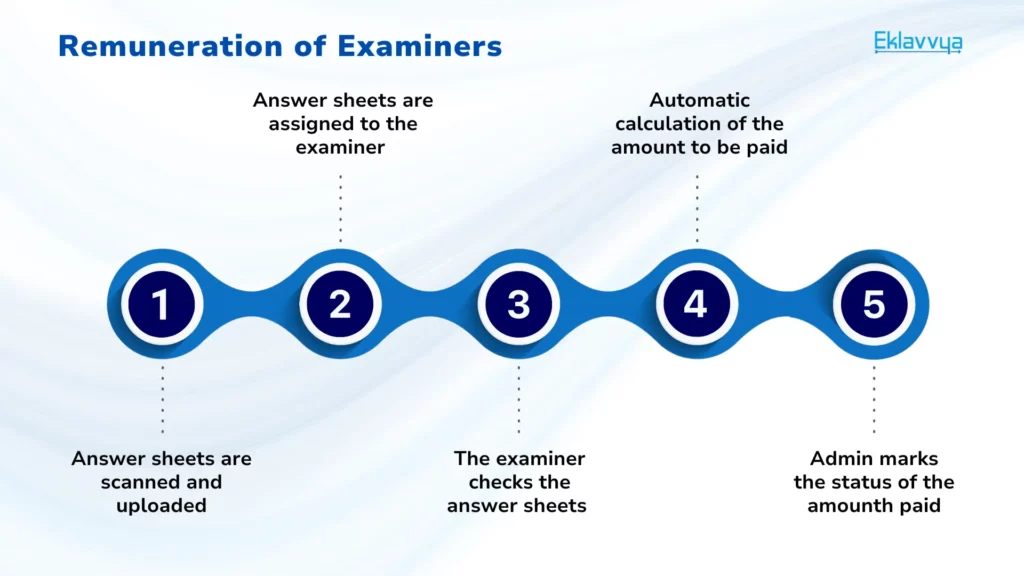
Total Remuneration for Individuals
You can get the facility to configure remuneration per answer sheet evaluation, and the system will automatically calculate the amount to be paid for each examiner.
Remuneration Status Update
Admin has the facility to mark the status of the amount paid to individual examiners.
Export Examiner Remuneration Details
You can also export a detailed report of the examiner’s remuneration in PDF format for further analysis. It can also be directly shared with your accountant for further processing.
Key Features of On-Screen Evaluation Systems
It automatically tracks the number of answer booklets evaluated by each examiner, making the entire process transparent and accountable. The system also calculates the total amount to be paid to each examiner based on the predefined payment scheme.
And for those who love to keep records, you can easily download detailed reports, making it easy to review and analyze payment distributions.

Benefits of Implementing On-Screen Evaluation Systems
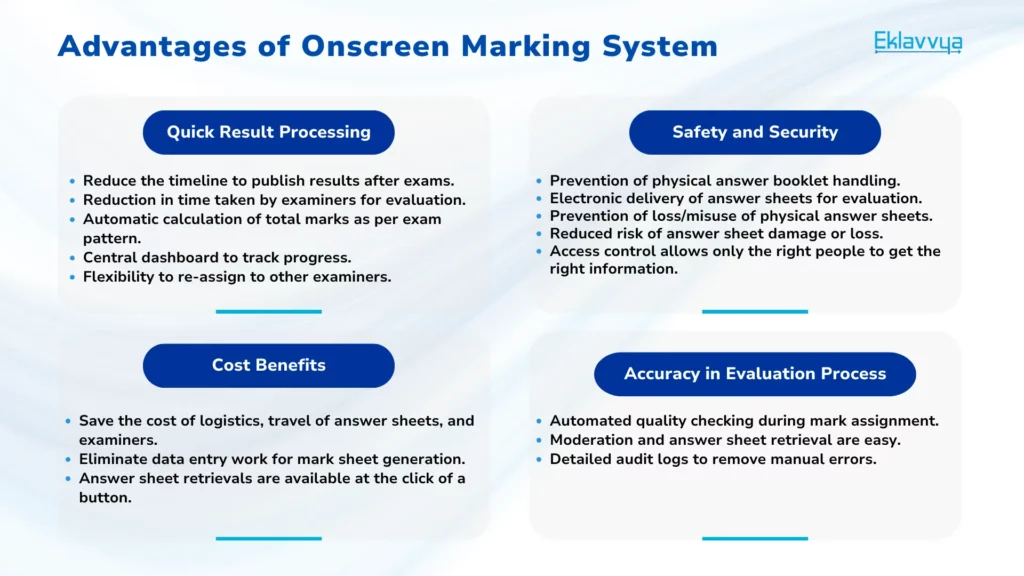
The perks of switching to an on-screen evaluation system are as clear as day. For starters, it slashes the time spent on manual calculations and data entry, freeing up staff to focus on more critical tasks.
What is the risk of errors? Significantly reduced. Moreover, the centralized management of examiner information enhances both security and privacy.
And let’s not forget the simplified management of payment processing and detailed analysis, which translates to a smoother operational flow.
Case Studies
Imagine an institution that switched to an on-screen evaluation system. Before the switch, managing examiner payments was a logistical nightmare, fraught with delays and discrepancies.
Post-switch, not only did the payment process become streamlined and error-free, but the institution also noticed an uptick in examiner satisfaction. Examiners received their payments promptly, and the institution could effortlessly keep track of payments and evaluations, all thanks to the on-screen evaluation system.
The institution can keep a centralized database of all the examiners with their bank account and registration details, which ultimately helps to simplify the answer sheet allocation and remuneration calculation process.
How to Implement an On-Screen Evaluation System in Your Institution
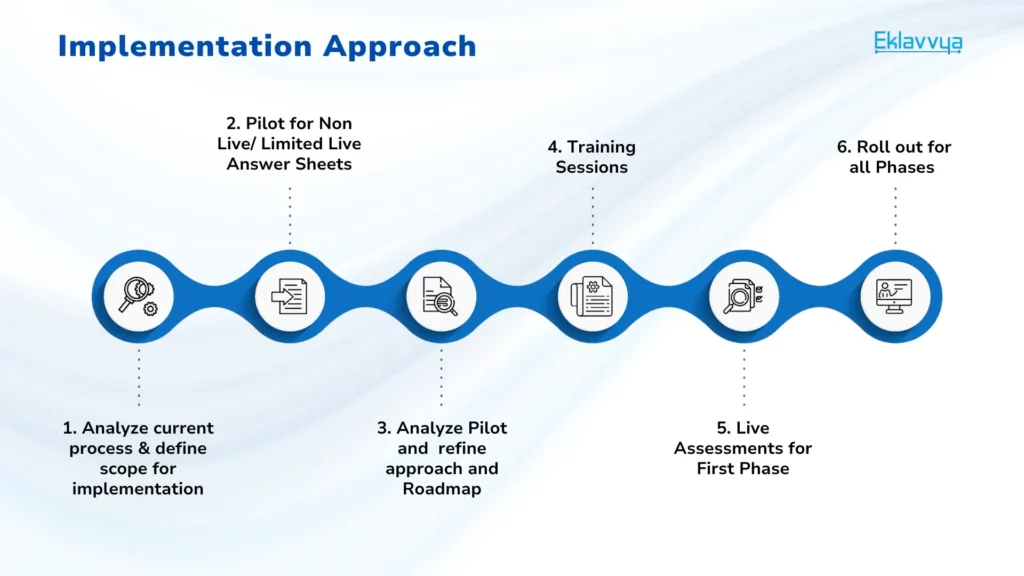
Implementing an on-screen evaluation system involves a few key steps. First, assess your institution’s specific needs and requirements. Next, choose a system that aligns with these needs, keeping an eye out for features like automation, data security, and user-friendliness.
Finally, ensure a smooth transition by training your staff on the new system, and you’re all set to transform your examiner remuneration management process.
Summary
The leap from traditional, manual remuneration management to an on-screen evaluation system is a game-changer for institutions far and wide. By automating the tracking and payment calculations, these systems not only save time but also significantly reduce the potential for errors.
So, if you’re looking to streamline your examiner remuneration process, it’s time to embrace the future with open arms and welcome an on-screen evaluation system into your institution.
Embracing an on-screen evaluation system could be the best next step for institutions looking to modernize and simplify their examiner remuneration management. It’s not just about making life easier; it’s about making the process smarter, faster, and more secure.

Yes, many on-screen evaluation systems are designed to integrate seamlessly with existing institutional systems, ensuring a smooth workflow. You can use the API provided by the systems to transfer examiner, and student data to the system and later fetch marks obtained in your system.
While any digital system poses some level of risk, reputable on-screen evaluation systems come equipped with robust security measures to protect sensitive information. Advanced facilities like 2-factor authentication implementation would help to secure access to authorized users.
Modern on-screen evaluation systems are designed with user-friendliness in mind, offering intuitive interfaces that require minimal training.


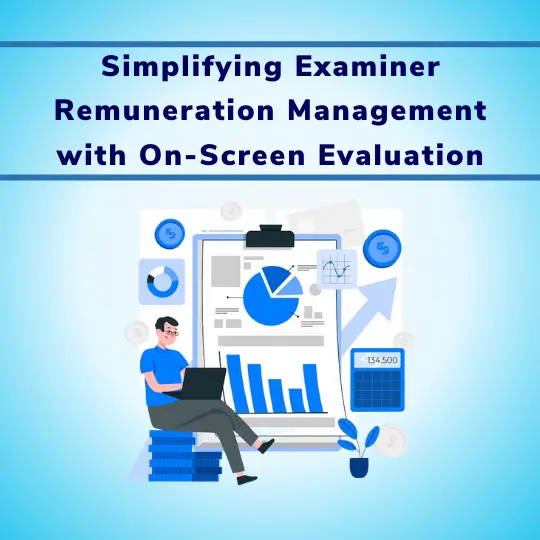

![How Government-Led Exams at 250+ Locations Are Setting New Standards of Integrity [Case Study]](https://www.eklavvya.com/blog/wp-content/uploads/2024/04/Enhancing-Exam-Integrity-Government-Certification-in-250-Locations-150x150.webp)
![Transforming Central Govt. Exams Evaluation: How Onscreen Marking is Leading the Charge [Case Study]](https://www.eklavvya.com/blog/wp-content/uploads/2024/04/How-Onscreen-Marking-Revolutionized-Central-Govt-Exams-Case-Study-1-150x150.webp)

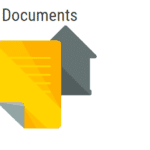













![How Onscreen Marking Revolutionized Central Govt Exams [Case Study]](https://www.eklavvya.com/blog/wp-content/uploads/2024/04/How-Onscreen-Marking-Revolutionized-Central-Govt-Exams-Case-Study-1-300x300.webp)
